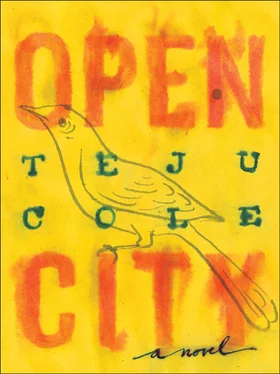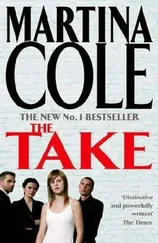The security island near the monument was unmanned. I stepped across the cordon, and into the grassy plot. Bending down, I lifted a stone from the grass and, as I did so, a pain shot through the back of my left hand.
I needed clothes for the ceremonies of my father’s burial in May 1989. As these things, and many other simple tasks, confused my mother in those days, most of the rites and the practical matters were taken care of by my father’s sister, my aunt Tinu. A few weeks before the burial, she took me to a tailor’s shop in Ajegunle, a sprawling slum of rusted roofs and open sewers, where the children were all poor and some of them were visibly malnourished. These children stared when my aunt and I emerged from her car because, from their point of view, we would have represented unimaginable wealth and privilege, an impression strengthened by my “whiteness.” The shop itself had an efficient air; its interior, lit only by natural light, was clean, and redolent of blue chalk. There were swatches of Dutch wax prints on the floor, semimatte squares of loud color that interrupted the gray shine of the concrete, and the tailor flattered me as he took measurements with his swiftly unfurled tape measure, as though it were the most natural thing in the world to congratulate someone on the length of his inseam or the breadth of his shoulders. He was perhaps trying to comfort me, having had a quiet word beforehand with my aunt, who had told him the purpose of our visit. He called out mysterious numbers to his assistant, numbers that would later be transmuted into clothing, a white shirt and dark suit for the burial, a buba and sokoto in indigo-dyed, hand-spun cloth for the funeral after-party.
The sensation of being in the tailor’s shop was, even in those circumstances, pleasant. I liked the smell of new cloth and, for me, the intimate wonder of getting measured for clothes was like that of getting your hair cut, or feeling the warm back of the doctor’s hand nestled against your throat as he checked your temperature. These were the rare cases in which you gave permission to a stranger to enter your personal space. You trusted the expertise proffered, and enjoyed the promise that the opaque maneuvers of this stranger’s hands would yield a result. The tailor, simply by doing his job that day, comforted me.
The funeral took place on a sunny day, in the afternoon, not on a rainy morning, not in wretched weather, as I suppose I expected funerals to be, as I still expect them to be. I recall now that Mahler, buried in Grinzing in 1911, was given the kind of quiet, private funeral he wanted, no speeches by the graveside, no religious readings, no florid poetry on the gravestone, just the name, Gustav Mahler. And, fittingly, it rained all through it until, as Bruno Walter tells it, the body was interred and the sun came out.
My father was buried on a particularly hot day, an unfunereal day. My new clothes, which were dark blue, not black, chafed, at the neck especially, and standing outside in the heat made me especially aware of the discomfort. The crowd jostling at Atan Cemetery was large, a somber crowd but, on account of its size, not without a touch of festivity. Many of the people present seemed to be friends and business associates of my grandfather, who was active in politics. Many of them had traveled from Ijebu-Ile and other towns in Ogun State to show their respects for my grandfather, who, though he held no formal political office at that time, had been a state commissioner in the seventies, and was still widely viewed as a kingmaker and power broker.
My experience of death was limited, less than limited. No one I knew well had died. But, as my father was interred that afternoon, I thought of someone else who had died, or had probably died. She was a young girl, around my age, I guessed. I was in the front seat, being driven to school, when the driver knocked her down. It happened in a poor neighborhood, probably her neighborhood, or near it, if she was walking to school. The girl was about eight or nine, and was dressed in a school uniform, which I distinctly remember was a pale lime green dress. I remember well that we’d seen her cross in front of the car once, in stalled traffic, a skinny girl, though not unhealthily so, merely gangly. Then she crossed again, and we hit her. The situation, our situation, was dangerous for a minute, as some men from the neighborhood appeared. The driver was dragged out of the car, after he hesitated awhile behind his wheel, and at first it seemed he would be beaten up. But then, perhaps suddenly realizing how grave his situation was, he was all business, clearing the area, carrying the child and putting her in the backseat. She was conscious but mute. We drove her to a hospital nearby, going so recklessly fast that we’d have hit another child if there’d been one in the way. The driver sweated, though it was a cool harmattan morning. The hospital was, or had until recently been, a residential house, now converted, with a neon cross placed outside it on the street. The girl was unconscious by this time, and I had a feeling, a feeling of certainty that even now I cannot explain, that she hadn’t merely fallen asleep or become comatose, but that she’d died. The driver, in a state of great agitation, carried her into the hospital. Please save me, I remember him repeating, to the nurses who had rushed outside to meet us. I remained in the car. I don’t remember it being a long wait, twenty minutes, maybe, after which he came out, solemn, and we continued our drive to school in silence.
I didn’t think about the little girl later that day, or the day afterward, or at any time at all afterward, I didn’t talk about her to my parents or to anyone else. The driver did not mention the episode either. She came back to mind only four or five years later, at my father’s funeral, at the graveside as the priest said prayers over his coffin, and I began to think in a general way about death. By then it was as though the little girl in the pale green school uniform, dead on a cool morning, a funereal morning, was something I had dreamed about, or heard in a telling by someone else.
After the burial, there had been a party at home. It wasn’t the large, buoyant party there might have been had father died at seventy-five, nor was it the entirely joyless ritual of frying akara that would have been the case had he died at forty. My father had died at forty-nine, and he’d been successful by the important standards: a good career as an engineer, a wife and son, a fine house. And so, there was a party, to celebrate his life, and lunch was cooked for the few dozen members of the family, and close friends, professional associates, members of the church, and neighbors, but colors were somber, there was no live music, and there was no alcohol. People sat in the living room, and outside under the rented canopy.
Some of the guests had brought young children, and the children ran around the tables, laughing, while the adults spoke in low tones and commiserated with each other. Memory fails me, but I believe that, for most of that afternoon, my mother was alone in her room, and my grandparents, and my aunt and uncle, received most of the guests. I had a role to play, my aunt had told me, and so I was to remain in the airless living room, too, uncomfortable in my scratchy buba and sokoto , and be as polite as possible to the many old men and women who insisted that I surely recognized them, who, in trying to comfort me, the orphan, invented in their heads a relationship with me that had little basis in reality, and that did not extend beyond that occasion in any meaningful way. From many of them, I heard reiterated the idea that I was to take care of my mother, that I was to become the man of the house now, which struck me even then as an unhelpful commonplace.
Читать дальше












